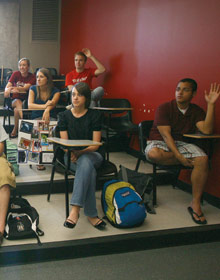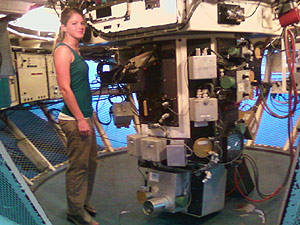
In this issue of Clif’s Notes, I want to update you on the budget for fiscal year 2013 and also comment on two recent internal audits we have completed.
 Fiscal year 2013 budget
Fiscal year 2013 budget
The state appropriations picture for fiscal year 2013 remains “fluid.” As you recall, the governor’s recommended budget includes an across the board reduction in funding for all institutions of higher education, both two-year and four-year, of 12.5 percent from the state funding allocated for fiscal year 2012. For Missouri State, the bottom line number from the budget of most importance is that our funding will shrink from $79,342,892 this year to $69,425,030 in fiscal year 2013, a reduction of nearly $10 million.
In subsequent conversations, both the governor’s office and legislators have expressed a desire to reduce the amount of the cut if at all possible. It is early in the legislative session, and we are hopeful that the reduction might be modified before the budget is finalized.
Handling the budget reduction
When we met with the Executive Budget Committee on Jan. 26, we discussed how we might handle the 12.5 percent reduction, as well as options should the cut be less. Once we have more details on state appropriations, we can be more precise in our planning.
However, the Executive Budget Committee did come to agreement on several elements of the plan, and also addressed some rumors that have begun to circulate on campus. I want to share that information with you here.
 The mid-year raise has been approved and is being implemented. This raise is secure and will continue as planned.
The mid-year raise has been approved and is being implemented. This raise is secure and will continue as planned.- All cost centers (provost, colleges, CFO and vice presidential units) will not be asked to reallocate more than the $3.7 million originally identified several weeks ago before the 12.5 percent cut was announced. Cost centers can continue to work on plans for funding their pro-rata share of this amount, which covers the mid-year raise and related benefits. The cost center plans may use one-time funds for up to one-third of the amount, provided the plan is approved in advance by the CFO. Any additional reductions required to cover the reduced state appropriations will be handled centrally, through increased revenue and through limited use of the reserves. By using this combination, we help protect the academic programs and essential services provided by the costs centers.
- As indicated previously, it is unlikely we will be able to fund the additional 2 percent across-the-board raise we had hoped to begin July 1, 2012.
- Summer school will not only continue, but it will be expanded in areas where there is demonstrated student demand.
- Faculty sabbaticals, tenure and promotion will be funded.
- Searches for open positions will continue. I have asked Provost Frank Einhellig and the other cost center heads to review all open positions to determine how best to proceed with searches where the cost center has the positions as the highest priority and also has the capacity to fund them.
- We will not have another retirement incentive program for faculty or staff in 2012.
- It is unlikely we will be able to increase the stipend for graduate assistantships as we had hoped.
I will continue to keep you informed, especially as we get more precise information on the state appropriations. Thank you for your continued thoughtful input and support as we work through the budget.
 Internal audits
Internal audits
Internal audits were recently completed on two important programs at the University:
- Pride Marching Band
- China Programs
I want to provide some context for you.
It is important to understand what an advantage we have with our office of internal audit. This office reports directly to the Board of Governors and is a key component of our commitment to continuous improvement. The office of internal audit reviews and reports on many University functions each year. The reports provide recommendations for improvement for the good of the programs and the University.
It would be rare — maybe impossible — to have an internal audit (or any comprehensive audit, for that matter) without some recommendations. No one is perfect, and even if we are doing things well, there is always room for improvement. In all cases, the feedback from the internal auditors should be viewed as positive “value added,” not as a negative
 Premier programs
Premier programs
As for the programs most recently audited, they are two of our premier programs.
The Pride Marching Band has been and continues to be a signature program for Missouri State. It has touched the lives of many students, has been a source of pride for our alumni and community, and is an excellent example of the kinds of outstanding music and performing arts programs we have at Missouri State.
Likewise, the China Programs distinguishes Missouri State, not only in Missouri, but nationally and internationally. The mission of the China Programs is to develop educational, research and cultural opportunities and exchanges between Missouri State University and its partner universities, and to promote understanding and friendship between the two countries. When the University made the commitment to develop educational partnerships in China, the Board of Governors and administration understood the University was entering uncharted waters, and they were aware of factors such as cultural differences, time required in building relationships and financial challenges. In the end, however, it was determined that the benefits of developing the China Programs outweighed the risks.
As a result, the China Programs are now among the distinctive features of Missouri State University as evidenced by the number of businesses, organizations and educational institutions that seek advice and assistance from Missouri State. The University’s new long-range plan calls for continued development of the China Programs over the next five years. As such, the China Program continues to be a work in progress.
Findings and recommendations
In the Marching Band audit, there were findings and recommendations related to financial aid, enrollment of students and band fees. In the China Programs audit, the findings and recommendations dealt with finances, planning and budgeting, business purpose of expenses, gifts and accounting policies and procedures. We are committed to following the recommendations and improving in all of these areas.
Conclusion
Thank you for all you do to advance Missouri State University. It is a privilege to serve you as interim president.
As always, I will keep you informed of developments as we move through the process.
 –Clif
–Clif

 During the fall semester, senior physics major Laurel Farris began an internship with Dr. Mike Reed. He was developing a variation of a 3-CCD photometer to study astroseismology — the vibration of stars — through funding from the National Science Foundation.
During the fall semester, senior physics major Laurel Farris began an internship with Dr. Mike Reed. He was developing a variation of a 3-CCD photometer to study astroseismology — the vibration of stars — through funding from the National Science Foundation.
In January, she was invited to visit Kitt Peak National Observatory, a mountaintop location with the most diverse collection of astronomical observatories on Earth, to assist in assembling the instrument and to record data. While on these observation trips, Laurel spent most of her time observing from an 18-story tall, four-meter telescope.
She credits her work with Dr. Reed for opening up many other opportunities; she can’t help but remember that not long ago, she was working the stock room of a retail chain store.
- Clif’s Notes for April 16, 2024 - April 16, 2024
- Clif’s Notes for April 9, 2024 - April 9, 2024
- Clif’s Notes for April 2, 2024 - April 2, 2024
- Clif’s Notes for March 26, 2024 - March 26, 2024
- Clif’s Notes for March 19, 2024 - March 19, 2024
- Clif’s Notes for March 5, 2024 - March 5, 2024
- Clif’s Notes for Feb. 27, 2024 - February 27, 2024
- Clif’s Notes for Feb. 20, 2024 - February 20, 2024
- Clif’s Notes for Feb. 13, 2024 - February 13, 2024
- Clif’s Notes for Feb. 6, 2024 - February 6, 2024
